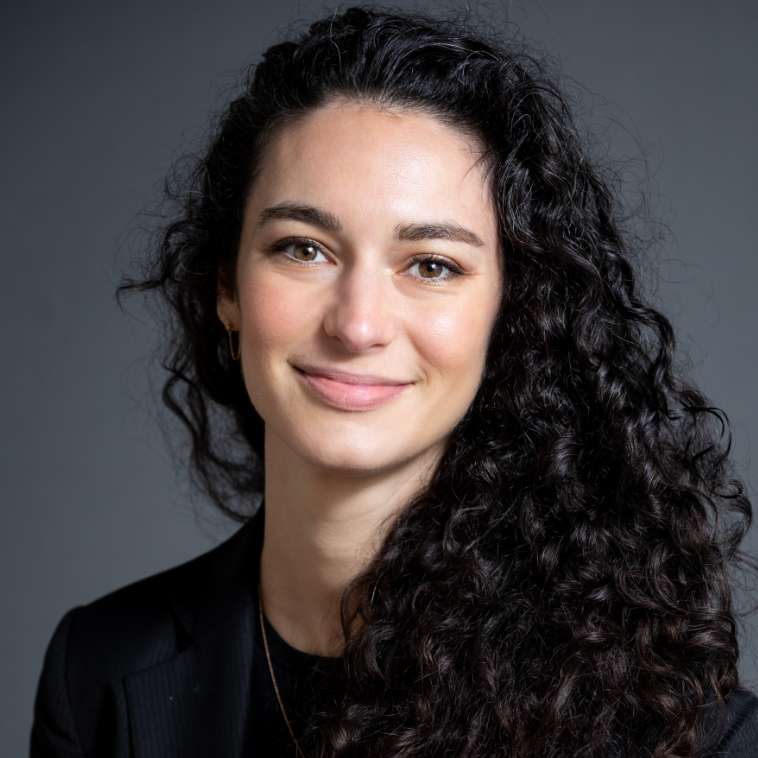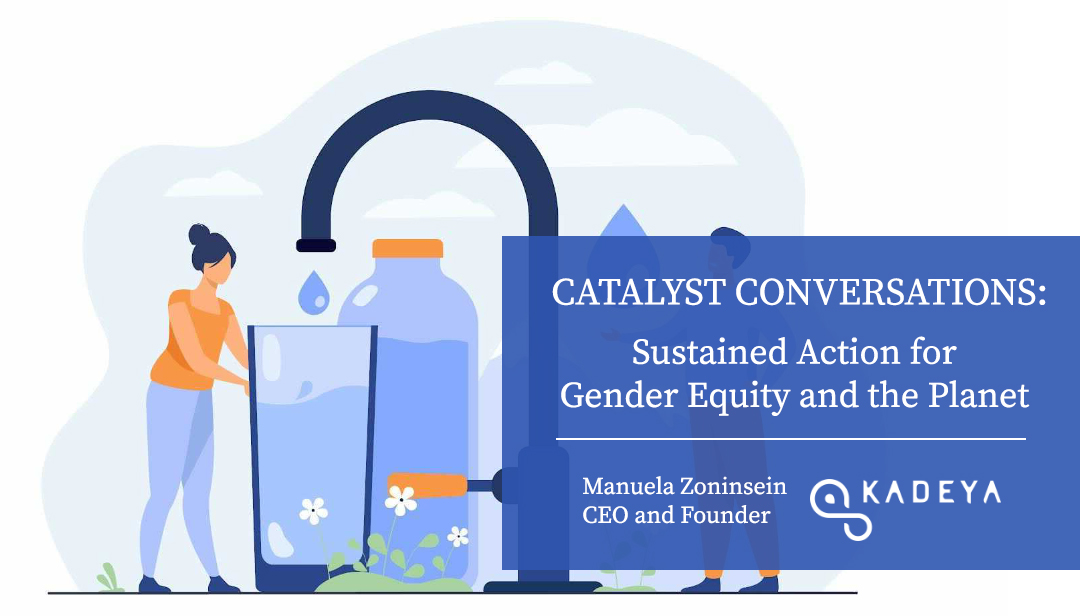SUSTAINED ACTION FOR GENDER EQUITY AND THE PLANET
March is Women’s History Month, a time to remember, celebrate and empower women. Historically, it has been celebrated to shine the light on women’s contributions to the world and highlight the work that remains to be done for gender equity. ISTC has been highlighting some incredible women on social media and we continue with this edition of Catalyst.
In this edition of Catalyst, we spoke with Maneula Zoninsein, founder and CEO of Kadeya, about her company, and her experiences as a woman in business.
Kadeya is a closed-loop water vending service powered by digitally-connected reusable water bottles and mini bottling stations. We deliver convenient, quality, low-cost water that reduces carbon footprints and digitizes water consumption for users. Kadeya offers sustainable solutions that are convenient and easily adoptable by reimagining the entire supply chain of water bottles.

Manuela Zoninsein, Founder and CEO of Kadeya
As the grandchild and child of immigrants and an immigrant myself, I grew up in a resource-conscious household. I had a Marxist economist Father and feminist anthropologist Mother, who often worried about our impact and responsibility to the world. It’s no surprise that my school projects, starting with my 2nd grade science fair, focused on sustainability.
I lived in China for almost a decade and it’s there that I I started to fully appreciate the impact individual actions can have at scale. Imagine 1.5 billion people using single-use chopsticks three times a day – that’s a lot of bamboo! When I came back to the U.S. I began working for Palantir, a large data software company. I was awed by the incredible perks we were afforded, but shocked by how many single-use water bottles the office consumed. I live my life according to Kant’s Principle of Universalizability: actions are morally permissible only if they are universalizable. Imagine eight billion humans consuming single-use water every day. Simple math shows the planet simply cannot support that for everyone. Which means, therefore, no one should do it.
As I walked to my office in New York City each morning, I would pass several CitiBike docking stations and wonder, “Can’t we build a bike-sharing system, but for water bottles? Why do we manufacture a new container every time someone needs a drink of water?” I started conducting customer interviews and learned the leading reason for single-use consumption among office workers was convenience. In building a water bottle business, I set as my North Star not only that we meet or beat single-use in terms of convenience, but also in terms of sustainability. At Kadeya, that’s what we do, while saving office managers a lot of time, money, and headaches, as well as carbon footprints. Turns out Millennial and Gen Z employees love Kadeya, so office managers also receive positive feedback and do better at their jobs, thanks to our service.
I’m frequently manterrupted and mansplained, and my ideas and suggestions get bropropriated – even as the sole founder who came up with the entire idea of the business! And, by the way, as the CEO who raised the capital needed to make it a reality. The beauty of building a company from the ground up is I get to choose with whom I work. If someone demonstrates a lack of respect, awareness, curiosity, or intentionality in how they operate, I’m in the lucky position to be able to walk away. There’s too little time, too much at stake, and too many amazing people out there to waste it on unhelpful individuals. This also serves Kadeya well. To build a startup demands loads of humility and a constant willingness to learn and improve. So my personal values and business needs reinforce each other nicely.
“Hardware is hard” is a trite truism which belies massive nuance and opportunity in the sector. There is an incredible wealth of talent, resources, and know-how out there if one is willing to put in the work to ask questions, do research, and be disciplined, especially about the numbers.
What we’re doing isn’t rocket science but does require managing multiple moving parts, thinking strategically from numerous angles, and gaining a good deal of context to understand why it hasn’t been done before. Building Kadeya has been like the hand game Cat’s Cradle: there’s always a new puzzle to be solved, but as we move forward our business model gets tighter, stronger, and more precise.
Circularity and automation powered by IoT and vertically integrated data.
What are your hopes for equity, sustainability, access to clean water within underrepresented and marginalized spaces?
Kadeya’s business model inextricably integrates several “social good” targets into the company’s financial success within the next decade on an annual recurring basis. Kadeya aims to avert 125 million metric tons CO2e; by 2035, we will have wiped out half a gigaton of CO2e with no reduction in convenience or quality for consumers. Kadeya will deliver safe, clean, zero-waste water along with individual hydration statistics to one billion people. Kadeya will create 20,000 quality technical jobs for underrepresented urban communities across the 10-most populous cities in the US. Kadeya’s impact across climate, health, and jobs creation to ensure sustainable, circular cities would of course multiply were Kadeya to scale beyond the US.
“ Stay focused on learning and discovering insights others can’t or don’t have because they stopped digging out of embarrassment or custom.”
Ask questions. A lot of them. Ignore when people condescend to you – stay focused on learning and discovering insights others can’t or don’t have because they stopped digging out of embarrassment or custom. Those moments of condescension are incredibly valuable and can be used to your advantage: people will break down assumptions and information for someone they underestimate because they don’t feel s/he is a potential competitor or threat. I don’t mean play dumb or play into stereotypes, but if someone is prejudiced and it grants you unique access to new information…I figure, why not leverage that?

